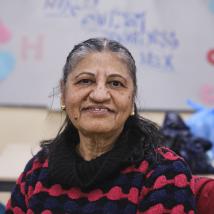South Asian women face significant challenges when accessing breast cancer care, leading to inequalities in their diagnosis and outcomes, according to a new study. Led by researchers from the ARC East of England, the study explores the experiences and perceptions of South Asian women throughout their cancer journeys, with the aim of improving healthcare services and patient outcomes.
New research published in Ethnicity & Health highlights the urgent need for culturally tailored approaches to address the disparities South Asian women face in accessing breast cancer care. The study identifies a range of barriers encountered during their 'cancer journeys', including a lack of understanding about the breast cancer screening process, language barriers, and the assumption that individuals fully understand the shock of a diagnosis and the medical terminology used. Additional challenges include the inability to speak directly with a Cancer Clinical Nurse due to being informed via a letter, as well as a lack of awareness regarding other available treatments and information about their upcoming care.
Researchers at the University of Hertfordshire collaborated with a voluntary community cancer support group, Asian Women Cancer Group (AWCG), and the East of England Cancer Alliance. The study aimed to explore how healthcare services can better support South Asian women in engaging with breast cancer care by understanding their experiences and perceptions throughout the process. This project is part of an ongoing body of ARC East of England research aimed at addressing health inequalities faced by marginalised communities.
“This work has opened up opportunities to address some recommendations; we are now discussing our findings with a team from the Cancer Alliance East of England. My own cancer journey identified the need for ‘holistic support’ to meet my specific needs. It has been so rewarding for me to work with AWCG who are from the same culture as me.
Professor Daksha Trivedi, Principal Investigator of the study
"This research is a significant step in informing cancer care that meets the needs of South Asian families.”
Professor Daksha Trivedi, Principal Investigator of the study
Breast cancer is the most common cancer in the UK. However, women from ethnic groups are less likely to be aware of breast cancer screenings or symptoms in comparison to Caucasian women, which leads to poorer recovery and survival outcomes. Survival rates for Black and South Asian women are lower than those for Caucasian women. Healthcare bodies, such as NHS England, widely recognise the urgent need to address cancer care inequalities for ethnic minority groups. This study marks a significant milestone in understanding and advocating for the healthcare needs of the South Asian community.
The project interviewed 14 women, aged 46 – 81 years old, who were either breast cancer survivors or currently undergoing treatment. The focus groups were held face-to-face in Greater London. The participants were asked questions with the aim of gathering insights into their lived experience about their 'cancer journey' and understanding their perceptions of routine breast cancer screenings, the referral process and support during and after this time. The groups also co-produced and refined recommendations to improve cancer services and experiences for this community.
"The voice of people directly affected is the most valuable sounding to take when considering the accessibility and effectiveness of cancer services, and this research provides really important insight to both service providers and strategists into the experience of cancer services by Asian Women."
Jai Jayaraman, Study collaborator from the NHS Cancer Alliance East of England
To enhance the cancer journey for South Asian women, the study offers several recommendations to improve care and support. These include recruiting Community Champions to raise awareness of breast cancer and address cultural barriers, ensuring a Cancer Clinical Nurse is present during initial diagnosis appointments, and promoting diverse representation in educational and promotional materials. Other recommendations include referring patients and their families to community support groups and providing tailored, culturally sensitive care by training clinicians to effectively use the Holistic Needs Assessment (HNA) Tool to effectively communicate with diverse groups.
“We have been very fortunate to be able to support this work in the ARC East of England Prevention and Early Detection in Health and Social Care theme. Clinicians and practitioners from around the country have been in touch with Daksha to talk about this work and it has been really interesting to find out what other organisations and researchers are doing in this area.”
Dr. Claire Thompson, Theme Lead of ARC EoE Prevention and Early Detection in Health and Social Care and Researcher in the study
